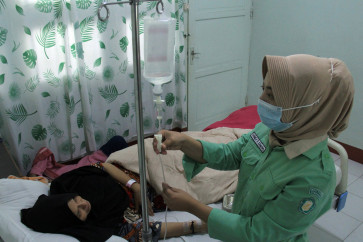BPJS Kesehatan books deficit below 50% of 2019 projection
The finance minister has credited the government's cash injection for the reduction in the national healthcare agency's recorded deficit.
Change Size
 BPJS Kesehatan has booked a huge deficit since its establishment in 2014 to manage the National Health Insurance (JKN) program, primarily due to its insufficient premium income to pay insurance claims. (Antara/Yulius Satria Wijaya)
BPJS Kesehatan has booked a huge deficit since its establishment in 2014 to manage the National Health Insurance (JKN) program, primarily due to its insufficient premium income to pay insurance claims. (Antara/Yulius Satria Wijaya)
T
he Health Care and Social Security Agency (BPJS Kesehatan) has recorded a deficit of Rp 15.5 trillion (US$1.13 million), 51.56 percent lower than the late-2019 projection of Rp 32 trillion, Finance Minister Sri Mulyani Indrawati has said.
The reduced deficit could be largely attributed to the government’s Rp 13.5 trillion cash injection provided through Presidential Decree No. 75/2019, she said.
“With the Presidential Decree, we were able to provide Rp 13.5 trillion to BPJS Kesehatan in the period between August and December [2019]. It has helped to reduce BPJS' deficit from the projected Rp 32 trillion to Rp 15.5 trillion,” Sri Mulyani said on Tuesday, as quoted by kompas.com.
The cash injection was made to cover the difference in premiums between low-income customers, known as contribution assistance recipients (PBI), and earning employees (PPU).
The minister went on to say that the government had allocated an additional Rp 48 trillion to help BPJS Kesehatan fulfill its obligation to finish reimbursing 5,000 medical centers and hospitals.
Read also: Can BPJS Kesehatan survive after drastic premium hikes?
BPJS Kesehatan executive director Fahmi Idris had said earlier that the agency had cleaned up its PBI data late last year. It discovered 27.44 million pieces of problematic data, including erroneously inputted national identity numbers.
The data cleansing was a requisite for obtaining the government's approval to increase the BPJS premiums.
BPJS Kesehatan has booked a huge deficit since its establishment in 2014 to manage the National Health Insurance (JKN) program, primarily due to its insufficient premium income to pay insurance claims.
This year has marked a new phase for Indonesia's universal healthcare program, with the government raising JKN premiums for the first time since it was launched.
The government announced last month that it would not provide cash injections this year to cover the BPJS deficit following the premium hike. (rfa)









